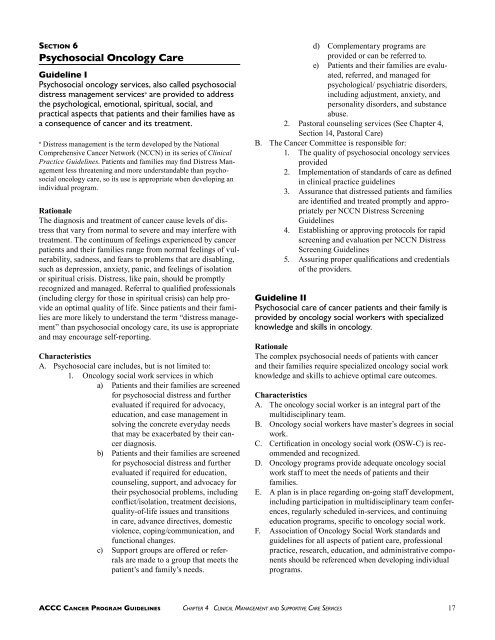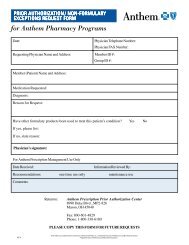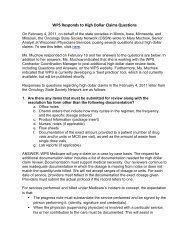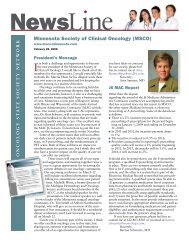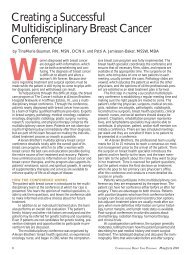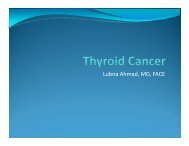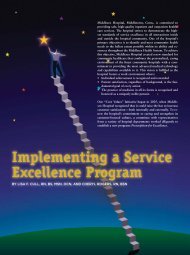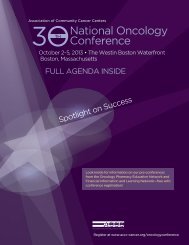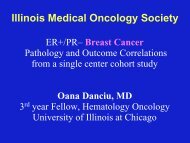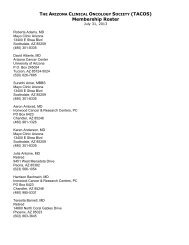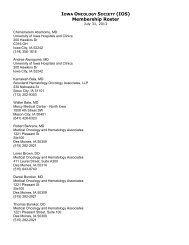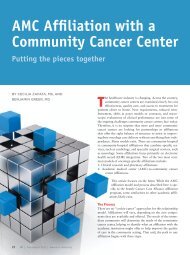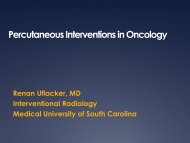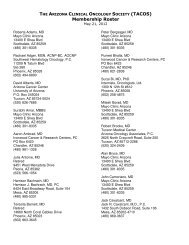Cancer Program Guidelines - Association of Community Cancer ...
Cancer Program Guidelines - Association of Community Cancer ...
Cancer Program Guidelines - Association of Community Cancer ...
Create successful ePaper yourself
Turn your PDF publications into a flip-book with our unique Google optimized e-Paper software.
Section 6<br />
Psychosocial Oncology Care<br />
Guideline I<br />
Psychosocial oncology services, also called psychosocial<br />
distress management services* are provided to address<br />
the psychological, emotional, spiritual, social, and<br />
practical aspects that patients and their families have as<br />
a consequence <strong>of</strong> cancer and its treatment.<br />
* Distress management is the term developed by the National<br />
Comprehensive <strong>Cancer</strong> Network (NCCN) in its series <strong>of</strong> Clinical<br />
Practice <strong>Guidelines</strong>. Patients and families may find Distress Management<br />
less threatening and more understandable than psychosocial<br />
oncology care, so its use is appropriate when developing an<br />
individual program.<br />
Rationale<br />
The diagnosis and treatment <strong>of</strong> cancer cause levels <strong>of</strong> distress<br />
that vary from normal to severe and may interfere with<br />
treatment. The continuum <strong>of</strong> feelings experienced by cancer<br />
patients and their families range from normal feelings <strong>of</strong> vulnerability,<br />
sadness, and fears to problems that are disabling,<br />
such as depression, anxiety, panic, and feelings <strong>of</strong> isolation<br />
or spiritual crisis. Distress, like pain, should be promptly<br />
recognized and managed. Referral to qualified pr<strong>of</strong>essionals<br />
(including clergy for those in spiritual crisis) can help provide<br />
an optimal quality <strong>of</strong> life. Since patients and their families<br />
are more likely to understand the term “distress management”<br />
than psychosocial oncology care, its use is appropriate<br />
and may encourage self-reporting.<br />
Characteristics<br />
A. Psychosocial care includes, but is not limited to:<br />
1. Oncology social work services in which<br />
a) Patients and their families are screened<br />
for psychosocial distress and further<br />
evaluated if required for advocacy,<br />
education, and case management in<br />
solving the concrete everyday needs<br />
that may be exacerbated by their cancer<br />
diagnosis.<br />
b) Patients and their families are screened<br />
for psychosocial distress and further<br />
evaluated if required for education,<br />
counseling, support, and advocacy for<br />
their psychosocial problems, including<br />
conflict/isolation, treatment decisions,<br />
quality-<strong>of</strong>-life issues and transitions<br />
in care, advance directives, domestic<br />
violence, coping/communication, and<br />
functional changes.<br />
c) Support groups are <strong>of</strong>fered or referrals<br />
are made to a group that meets the<br />
patient’s and family’s needs.<br />
d) Complementary programs are<br />
provided or can be referred to.<br />
e) Patients and their families are evaluated,<br />
referred, and managed for<br />
psychological/ psychiatric disorders,<br />
including adjustment, anxiety, and<br />
personality disorders, and substance<br />
abuse.<br />
2. Pastoral counseling services (See Chapter 4,<br />
Section 14, Pastoral Care)<br />
B. The <strong>Cancer</strong> Committee is responsible for:<br />
1. The quality <strong>of</strong> psychosocial oncology services<br />
provided<br />
2. Implementation <strong>of</strong> standards <strong>of</strong> care as defined<br />
in clinical practice guidelines<br />
3. Assurance that distressed patients and families<br />
are identified and treated promptly and appropriately<br />
per NCCN Distress Screening<br />
<strong>Guidelines</strong><br />
4. Establishing or approving protocols for rapid<br />
screening and evaluation per NCCN Distress<br />
Screening <strong>Guidelines</strong><br />
5. Assuring proper qualifications and credentials<br />
<strong>of</strong> the providers.<br />
Guideline II<br />
Psychosocial care <strong>of</strong> cancer patients and their family is<br />
provided by oncology social workers with specialized<br />
knowledge and skills in oncology.<br />
Rationale<br />
The complex psychosocial needs <strong>of</strong> patients with cancer<br />
and their families require specialized oncology social work<br />
knowledge and skills to achieve optimal care outcomes.<br />
Characteristics<br />
A. The oncology social worker is an integral part <strong>of</strong> the<br />
multidisciplinary team.<br />
B. Oncology social workers have master’s degrees in social<br />
work.<br />
C. Certification in oncology social work (OSW-C) is recommended<br />
and recognized.<br />
D. Oncology programs provide adequate oncology social<br />
work staff to meet the needs <strong>of</strong> patients and their<br />
families.<br />
E. A plan is in place regarding on-going staff development,<br />
including participation in multidisciplinary team conferences,<br />
regularly scheduled in-services, and continuing<br />
education programs, specific to oncology social work.<br />
F. <strong>Association</strong> <strong>of</strong> Oncology Social Work standards and<br />
guidelines for all aspects <strong>of</strong> patient care, pr<strong>of</strong>essional<br />
practice, research, education, and administrative components<br />
should be referenced when developing individual<br />
programs.<br />
ACCC <strong>Cancer</strong> <strong>Program</strong> <strong>Guidelines</strong> Chapter 4 Clinical Management and Supportive Care Services 17


